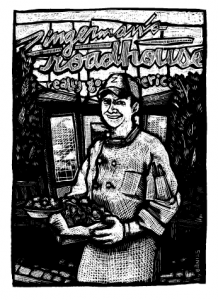The Role of Belief, part two
This essay is an excerpt from Zingerman’s Guide to Good Leading, Volume 3: A Lapsed Anarchist’s Approach to Managing Yourself by Ari Weinzweig (coming in the Fall of 2013). Stay tuned for the next few days to read the whole essay.
 The Role of Belief in Building a Sustainable Business
The Role of Belief in Building a Sustainable Business
The Boss’ Belief Sets the Bar
If we, as leaders, don’t truly believe in the business, ourselves, our products, the staff. . . well, we’re the one’s setting the organizational bar. If our passions aren’t particularly high, if our doubts are significant, and our commitments uncertain . . . there’s just no way around the reality that disbelief (or lukewarm belief at best) is going to take down most everyone and everything else in the business.
Building Belief When you’re not the Big Boss
If you’re thinking that you’re “only a manager” and “can’t control” (it’s actually all out of control, but that’s another article) what your whole organization is doing—or not doing—I’ll counter by arguing that you can create a vision of success that applies only to your own area. Even if the rest of the organization is basically oblivious, you can just start going after it on your own, working constructively within limits that come down from corporate. I haven’t had to do this myself, so I know you can roll your eyes with cynicism on this subject if you want—Paul and I started the company and thankfully I haven’t had to go into a so-so set- ting and start something special. But I’ve watched people who’ve come to ZingTrain seminars pick up positive pieces of what we do and successfully take them back to their own businesses; many work in places where the organization overall isn’t really going for greatness, but these folks seem to find a way to make big things happen in their own department anyways. Before long, the people who work for and with them become believers. Energy, commitment, caring and quality all go up. Having worked at, and around, this approach for nearly a year now I’ve begun to break the belief stuff down into a series of different layers. All are important. Any are helpful.
1. Belief in Self
I don’t think it takes a PhD psychologist to predict that we’re going to do better in every aspect of our lives when we have a calm, grounded, humble respect for, and belief in, ourselves. Our internal dialogue, our self image, our belief in our abilities, has a huge impact on our ability to inspire others around us and on our own odds of attain- ing our dreams.
While I grew up inspired by Isaac Asimov’s science fiction stories set on other planets, he had some very insightful things to say about life here on Earth. In the context of this bit on belief in self, he said: “And above all things, never think that you’re not good enough yourself. A man should never think that. My belief is that in life people will take you at your own reckoning.” It’s pretty much true. Go into any difficult interaction, personal or professional, from a place of self-doubt and internal dissonance and almost inevitably the other person will pick up on it.
By contrast, go in with a calm, centered sense of self and interact with the same person and you’ll almost always end up with a far more positive outcome.
Ian Mays, a poet by profession, who now sells pastrami and potato salad at the Deli, said, “I enjoy my time here. The space is comfortable, and I’m allowed to be who I am. There’s a lot of opportunity to be nice and have fun and eat good food. We always came here to the Deli as kids. We looked forward to the food, but that was almost secondary—it was more looking forward to having a good time. We believed we were going to have a good time. I still believe that I’m going to come here and have a good time during most of my day. I feel like I can give a part of myself to others when I‘m at work, but I believe I can do it in a way that’s consistent with who I really am.”
Part of our work as leaders, then, is to actively help each staff member to see that they have a solid shot at being successful, to know that they’re good enough and smart enough, strong enough and talented enough to do well in our world. While this issue rarely comes up in business literature, the more I think about it, the more obvious it is—we can’t build the kind of positive organization people will believe in, if the people who are part of it don’t also believe in themselves, and conversely, if we don’t believe in them. Author, and Emma Goldman’s great niece, Dawna Markova, said in her excellent and insightful work, I Will Not Die an Unlived Life, “If your purpose is only about you, it has no branches. If it is only about the rest of the world, it has no roots.” Together—a healthy grounded individual working in a healthy organization, with shared vision and values, where each believes in the ability of the other— we can get to great things!
2. Belief in the Business
Let me state my supposition up front: pretty much every- thing in an organization is going to be better when the people working in it believe in what the business is doing. When we believe, we work harder, we give more, and we put a level of energy and passion into play that’s clearly essential to creating anything really great. With very few exceptions, people want—I’m tempted to say “need”—to believe that they’re part of a great organization, that their work makes a difference, that what they’re selling is a good product, that the organization they’re part of is generally doing good in the world. Our job as leaders is to make that scenario into a reality. I believe we can, and that when we do everything—from feelings to finance to food quality—is going to work more effectively.
Emily Hiber, a supervisor in our Next Door café, used to be a teacher, but has opted to work here instead. “I was just talking to a friend of mine whose husband is just super unhappy with his work,” she told me. “He’s not earning very much and they were feeling totally unfulfilled. I was saying that, while I’m not in the ‘lap of luxury,’ my work pays me a livable wage and because I believe in it so much, and in the people that are involved with it, that I’m really fulfilled in what I do. My commitment is really high because I believe in the people that I work for and with. I think the people who work here are willing to buy in because they really believe in the service we provide and the products that we’re introducing people to. And also to our way of thinking about food and work and relationships.”
Bill Rosemurgy, trained as a naval architect, now crafting cappuccinos here, added, “Belief is very important. You get a sense of purpose. It’s very easy to believe in what I’m doing here. That was one of the first things that I picked up on a few weeks after I started. It’s probably one of the biggest reasons I can still work here after all these years. I couldn’t go to work every day doing something I didn’t believe in, something that didn’t have any purpose in it.”
Check back tomorrow for Part Three of this essay!




Zingerman’s Art for Sale